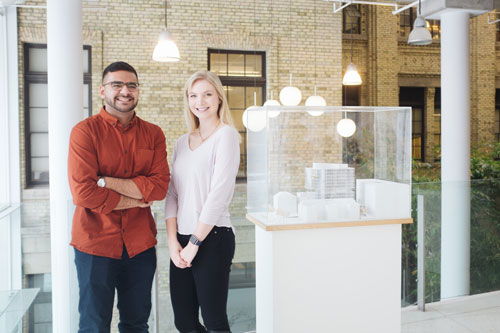The Power of Story (APS445H) is an academic course offered by ILead that allows people to explore their own personal narratives and discover how their experiences shape them as engineers and leaders. I spoke with Annie Simpson, one of the co-instructors of the course, and two of the students, Heather Kelsall and Mohammed Manek, about their experiences with The Power of Story.
After seeing a presentation in 2012 by an American professor who was teaching a course on storytelling for engineers, Annie Simpson was inspired to develop something similar for engineering students at U of T. Storytelling brings together public speaking practice (which really builds confidence) with personal reflection (which deepens self-awareness and leadership), and with narrative theory (how we live in a storied world).
“I saw the potential for a course like this to build a strong learning community and propel students forward in their professional lives with a sense of clarity and purpose,” reflected Annie, who co-teaches the popular course with Dr. Penny Kinnear.
Annie described how one’s sense of leadership grows and deepens when we know who we are. When we better understand the experiences that have shaped us, our multiple identities, and our values, we come to better understand leadership. The course also aims to instill in students that their own life (if deeply reflected on) contains all the information needed for a meaningful future and career.
Heather and Mohammed took APS445 in Fall 2016, and their takeaways from the course are exactly what Annie and Penny envisioned students to walk away with. They both spoke about how they were good at public speaking prior to taking this course, but what they learned in the course, really helped bring it all together.
“There was a lot of formal stuff we learned about storytelling, which gave me the language and tools to talk about stories – and that helped me grow as a person. We also did an exercise based on value-added leadership, and that gave me the vocabulary to be a leader and also recognize what has made me the leader that I am today,” said Mohammed. Heather also commented how it was interesting to see their journey throughout the course, as all three of their presentations throughout had been recorded, and seeing themselves get better with each one. She also learned how to find the value in her past experiences, and really reflect on how they have shaped her.
“I was reflecting a lot on my first year, and I doubted whether I wanted to continue [with engineering], and looking back, I learned to find value in what seemed to be negative experiences, and take a new perspective on them. This reignited my passion for engineering,” Heather revealed.
What Heather and Mohammed both found to be the best parts of the course was the community that was built. The exercises and assignments in the course helped students grow closer and build a strong community.
Mohammed stated: “You’re meeting people every day, but you don’t always get the opportunity to understand their motivations. It was wonderful to reach that level of comfort with each other and share struggles and triumphs. It was interesting and great to hear the extremes of people’s stories.” Heather also mentioned that she had made some great friends in the course, since they got to know each other in such an intimate setting.
They both hope to continue reflecting and treating their own and others’ stories and experiences with kindness and deconstructing them to understand the value of those experiences. Everyone has stories to tell, but it is the way you tell them, and what you do with them that matters.
-Namya Syal

